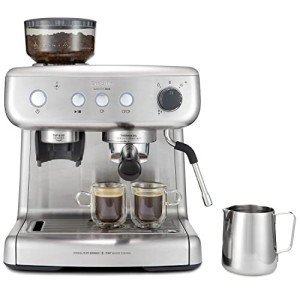The World of High-Quality Espresso Machines: A Comprehensive Guide
Espresso has actually ended up being a cherished beverage among coffee enthusiasts worldwide, known for its rich taste, intense scent, and adaptability. The heart of an excellent espresso lies in the machine used to brew it. High-quality espresso machines are created to provide the ideal shot, making them an important investment for coffee enthusiasts. This article checks out different types of high-quality espresso machines, their features, maintenance tips, and responses to frequently asked concerns.
Kinds Of High-Quality Espresso Machines
High-quality espresso machines fall under several categories, dealing with various choices, ability levels, and spending plans. The primary types consist of:
| Type of Machine | Description | Suitable User |
|---|---|---|
| Manual Espresso Machines | Needs user ability to manage extraction and pressure. Offers the most control over the brewing procedure. | Experienced baristas and lovers |
| Semi-Automatic Machines | Combines manual operation with automation. www.coffeee.uk control the grind and tamping, while the machine handles water dispersion. | Intermediate users |
| Automatic Espresso Machines | Automate the brewing procedure, permitting programmable brewing times and temperature levels. | Casual coffee drinkers |
| Super-Automatic Machines | Have built-in mills and are totally automated, managing everything from grinding to developing and steaming. | Users seeking convenience |
| Commercial Espresso Machines | Developed for high volume use in cafes and restaurants, using resilience and speed. | Entrepreneur |
Comprehensive Overview of Each Type
Manual Espresso Machines
- Pros: Complete control over the developing procedure; can produce remarkable quality espresso.
- Cons: Requires significant ability; lengthy.
Semi-Automatic Machines
- Pros: Balanced control, mixing manual and automatic procedures; exceptional quality espresso is still possible.
- Cons: Requires some understanding and experience to master.
Automatic Espresso Machines
- Pros: User-friendly; reduces the finding out curve while still producing high-quality espresso.
- Cons: Still needs some understanding of coffee-making basics.
Super-Automatic Machines
- Pros: Maximal benefit; little ability needed; perfect for people or households who desire coffee without difficulty.
- Cons: Higher price point; might lack the fine-tuning capabilities of manual machines.
Commercial Espresso Machines
- Pros: Built for durability and performance; often consists of functions for high-volume turns.
- Cons: Expensive; may be overkill for home use.
Key Features to Consider
When looking for a high-quality espresso machine, a number of key features should be taken into consideration:
- Pressure and Pump Type: Look for machines with at least 9 bars of pressure, which is essential for extracting the best taste from coffee beans.
- Boiler Type: Single, double, and heat exchanger boilers each affect how the machine carries out and the speed of developing.
- Construct Quality: High-quality materials such as stainless steel are preferable for sturdiness and aesthetic appeals.
- Relieve of Use and Cleaning: Some machines need substantial cleansing, while others are developed for easy upkeep.
- Temperature level Control: Consistent temperature level is important; consider machines with PID controllers for exact control.
Advantages of High-Quality Espresso Machines
Buying a high-quality espresso machine offers a multitude of advantages:
- Superior Quality: High-end machines permit higher control, resulting in more delicious espresso.
- Sturdiness: Built to last, quality machines require less repair work and replacements.
- Customization: Users can delight in a customized experience by adjusting grind size, shot timing, and other settings.
- Increased Convenience: Automatic and super-automatic options allow connoisseurs to enjoy espresso with very little effort.
Upkeep and Care for High-Quality Espresso Machines
To keep an espresso machine functioning efficiently, routine upkeep is essential. Here are pointers for maintaining a high-quality espresso machine:
Descale Regularly:
- Use a descaling solution every few months to prevent buildup of minerals from water, which can affect taste and efficiency.
Tidy the Brew Group:
- For machines with a removable brew group, tidy it frequently to guarantee a clean extraction.
Change Water Filters:
- Use a water filter and alter it as required to lessen impurities in your developing water.
Daily Cleanings:
- Rinse the portafilter and group head after each use to avoid oil accumulation.
Keep an Eye on the Parts:
- Monitor seals, gaskets, and other parts for wear and tear and change them as essential.
Often Asked Questions (FAQs)
1. What is the best espresso machine for beginners?
For newbies, a semi-automatic machine typically provides an excellent balance of use and control, enabling users to discover the abilities necessary for making excellent espresso.
2. Are super-automatic machines worth the financial investment?
Yes, for those who prioritize convenience and ease over control, super-automatic machines can be a worthy investment, especially for households or busy professionals.
3. Just how much should I expect to invest on a high-quality espresso machine?
High-quality espresso machines vary significantly in rate, with manual machines beginning at a few hundred dollars, while super-automatic or commercial machines can exceed several thousand.
4. Can I make other coffee beverages with an espresso machine?
Yes, lots of espresso machines have steam wands or accessories that enable users to produce lattes, cappuccinos, and more.
5. How long do espresso machines typically last?
With appropriate maintenance, high-quality espresso machines can last over a years, making them a long-term financial investment in your coffee pleasure.
High-quality espresso machines yield a transformative coffee experience, whether delighted in in your home or in a commercial setting. By comprehending the types available, their functions, and the upkeep required to keep them running effectively, consumers can make educated choices that elevate their coffee-drinking experience.

